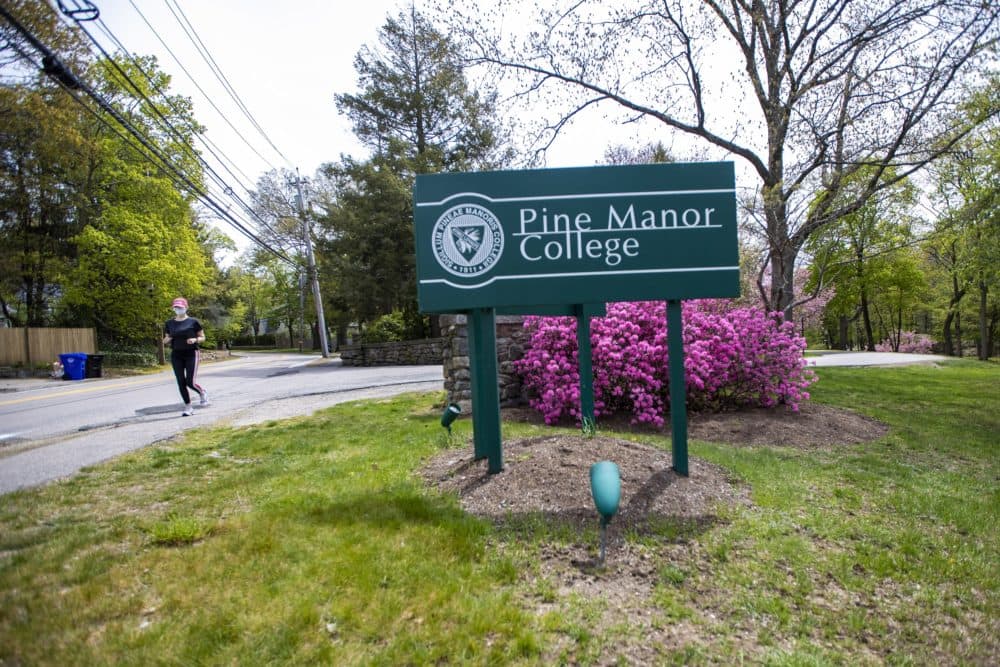Advertisement
Under Financial Stress, Pine Manor College To Join Boston College
Resume
Pine Manor College will enter into an "educational partnership" with Boston College, after the pandemic-related closures stretched its finances to a breaking point.
A memorandum of understanding between the two schools paves the way for Boston College to take on all of Pine Manor's assets — including their leafy, 45-acre campus in Chestnut Hill — as well as their liabilities. Boston College will also cover Pine Manor's operating expenses as they "teach out" current students for up to two years.
It's the first such consolidation announced since the pandemic, which is putting a strain on college finances across Massachusetts and worldwide.
At the same time, the two institutions will work together to establish the Pine Manor Institute for Student Success, which will support outreach and academic support to Boston College's first-generation and low-income students — the primary demographic served by Pine Manor for more than a decade. It will do so with the help of a $50 million endowment to be established by Boston College.
Pine Manor president Tom O'Reilly described the agreement as "a golden opportunity in an incredibly difficult time." He argued that the agreement indefinitely extends Pine Manor's "student success" model: pairing underserved students with comprehensive support and assistance.
During that two-year teach-out period, Pine Manor's current students will be able to continue learning from the existing faculty. They'll also be given the option to apply to learn at Boston College's evening school, the Woods College of Advancing Studies.
O'Reilly declined to speculate as to whether current Pine Manor faculty and staff — including himself — could find work at Boston College after those years have elapsed, only saying that it's all "in the realm of possibility."
Per the agreement, staff who do not play a part in the continued functioning of Pine Manor College during the teach-out will be eligible for severance and given help in finding other positions.
Pine Manor's campus — complete with a historic mansion and residential halls — is only a mile and a half away from BC's Chestnut Hill hub.
The two schools also share a historic commitment to educating underserved communities of students, but their student bodies don't resemble each other. Students of color and international students made up 93% of Pine Manor's enrollment in the fall of 2018 (the latest data available), while only 42% of Boston College's enrollment came from the same communities.
In early March, the New England Commission of Higher Education — the region's lead accreditor of colleges and universities — issued a notation to Pine Manor College, warning that the college's accreditation would be endangered if its financial situation worsened.
That notation came as it became clear how the coronavirus epidemic would strike at some of the college's key sources of revenue.
Barbara Brittingham, the commission's outgoing president, praised O'Reilly and his team for their efforts to diversify the college's revenue in recent years as they sought to stave off closure. The college built up an on-campus childcare program and rented its campus out for weddings.
"It was all great — until it wasn't," Brittingham said, referring to the dawning realization that summer programs, outdoors weddings and fall enrollment would all take a hit in the pandemic.
Experts have warned for years that America's small-college marketplace — especially concentrated in New England — was bound to shrink under pressure. But given the context of the pandemic, Brittingham said "it would not surprise" her if the Pine Manor news is the first in a series of higher-education mergers and acquisitions coming soon.
Brittingham also applauded Pine Manor for its candor about its dire financial straits, compared to Mount Ida College, which closed suddenly in 2018.
"They've done an extraordinarily good job of being transparent [about] the situation — going so far as to advise students to have a Plan B," Brittingham said.
O'Reilly said the agreement with Boston College will still need "the appropriate regulatory approvals" from NECHE as well as the state's department of higher education. He said he hopes the agreement will provided "a level of certainty" to students and staff in uncertain times.
This article was originally published on May 13, 2020.
This segment aired on May 14, 2020.
